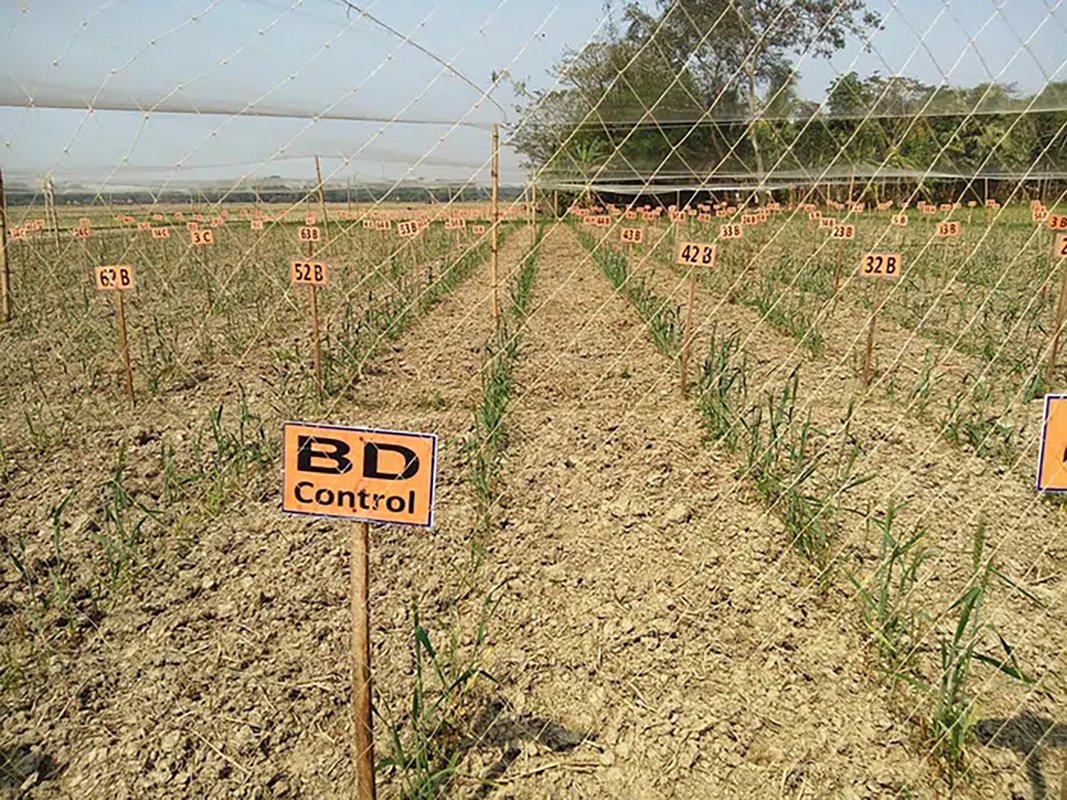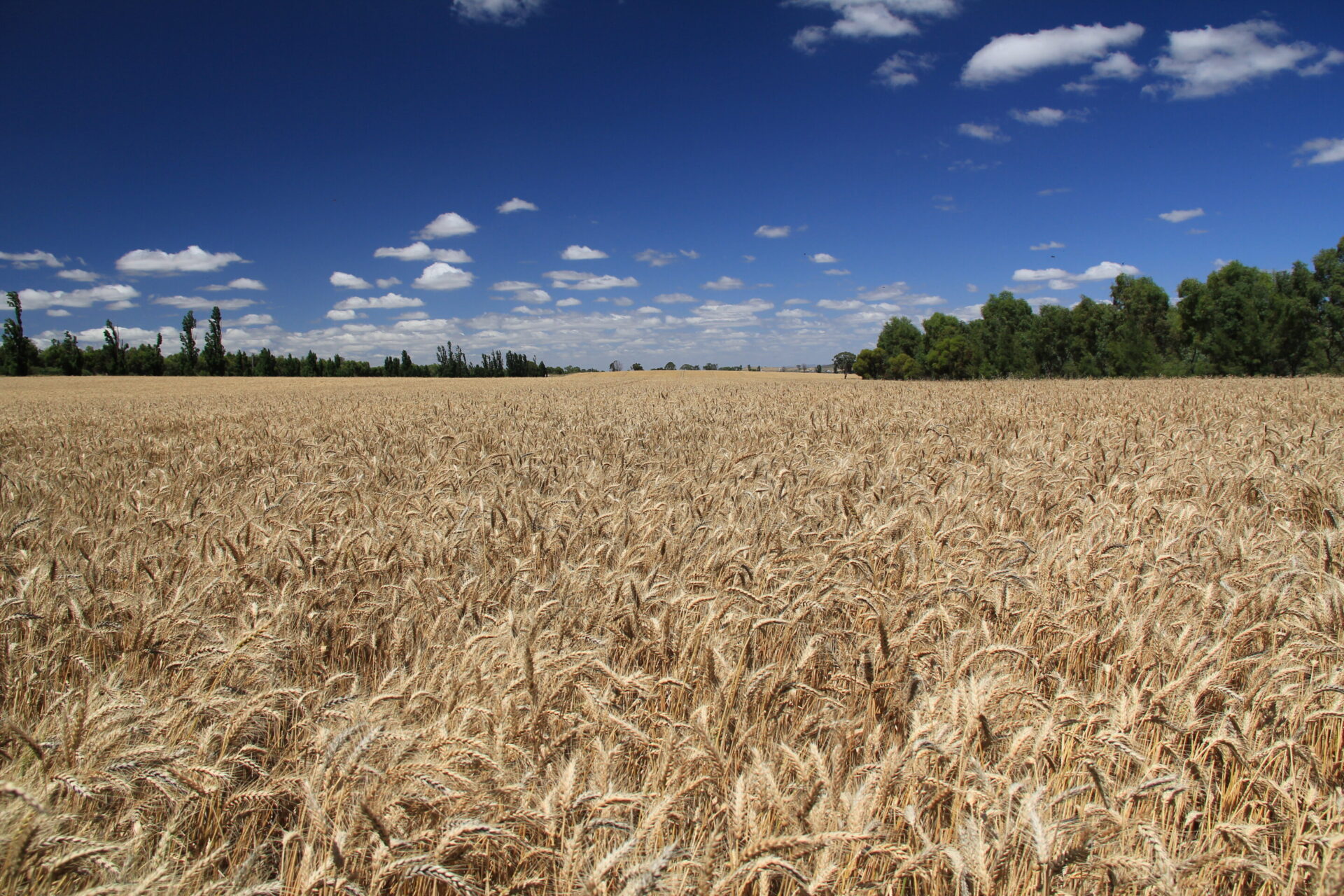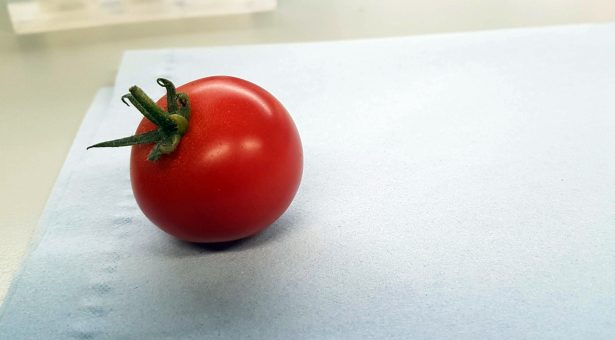
The wheat grown in Bangladesh is relatively salt tolerant. Researchers have now mutated this wheat variety to create new varieties that tolerate salt even better and that can provide higher yields.
CREDIT: Olof Olsson
Researchers at the University of Gothenburg have developed several new varieties of wheat that tolerate soils with higher salt concentrations. After having mutated a wheat variety from Bangladesh, they now have a wheat with seeds that weigh three times more and that germinate almost twice as often as the original variety.
The wheat, which grows in fields near the coast in Bangladesh, has a certain tolerance to salt in soils, which is important when more and more farmland around the world is being exposed to saltwater.
By mutating the wheat seeds from these coastal fields, researchers at the University of Gothenburg were able to develop approximately 2,000 lines of wheat. The 35 lines that germinated the best at different field and lab experiments were planted in an automated greenhouse in Australia, where different saline concentrations were applied to the plants that were then weighed. They were photographed each day until the wheat had formed its ears.
The findings were striking.
Genes for salt tolerance identified
“We developed wheat lines where the average weight of the seeds was three times higher and that germinated more often than the original wheat from Bangladesh,” says Johanna Lethin, a doctoral student at the Department of Biological and Environmental Sciences at the University of Gothenburg.
Using DNA analyses and studies of other research, the team was also able to identify what genes control salt tolerance in the wheat plant.
“This is a milestone in our research. Now we have a couple of genes we know are involved in salt tolerance. The next step is to test if these genes are also in our best wheat varieties that we have mutated into existence.”
The Earth’s population is growing and in 2050, there will be 10 billion people on the planet who all need to be fed. At the same time, climate changes are causing the Earth’s arable land to dry up and other areas to be flooded by rising seas. All this increases interest in a crop that can tolerate salt in soil.
2,000 hectares lost every day
“It is incredibly important to try to develop a salt-tolerant variety with good yields. Currently, we are losing approximately 2,000 hectares a day to rising seas and improper irrigation methods that increase soil salinisation.”
Some experiments remain to do, but the potential in this discovery is global. Today, about 8 per cent of the world’s arable land is no longer usable for crops because of salt contamination and more than half of the world’s countries are affected. In Egypt, Kenya and Argentina, wheat cannot be grown on large areas and even low-lying areas of Europe, like the Netherlands, have these problems. Even in those parts of Asia where rice is currently the dominant crop, salt-tolerant wheat will become an important part of the future food supply since wheat farming requires much less water than rice.
“The next stage is to plant the salt-tolerant varieties in fields in Bangladesh. I would estimate that it will take about five years before we can have commercial production of salt-tolerant wheat, depending on how the field tests go.”
Facts: GMO and mutations
This research does not use the sometimes highly criticised method of gene modification (GMO). In GMO, a gene from one plant (such as a plant that can resist fungus) is placed in another plant, such as wheat, so that farmers can avoid using excess insecticides. Instead, the researchers have made targeted mutations in the seeds using a chemical. In this way, nothing is placed in the plant and all mutations could potentially have happened naturally.
Original Article: Researchers have developed a potential super wheat for salty soils
More from: University of Gothenburg
The Latest Updates from Bing News & Google News
Go deeper with Bing News on:
Salt tolerant wheat
- Bahari: food writer Dina Macki on Omani cuisine and Zanzibari flavours
In her new cookbook, Dina Macki examines the intertwined but distinct cuisines of Oman and Zanzibar, exploring how they were shaped by seafarers and the ocean itself.
- Canada may see 5% boost in wheat output
OTTAWA, QUEBEC, CANADA — Canada’s grain output in the upcoming marketing year is forecast to increase by nearly 5%, boosted mainly by a surge in wheat production, according to a report from the ...
- Seeds From Wild Crop Relatives Could Help Agriculture Weather Climate Change
The hardy wild cousins of domesticated crops can teach us how to adapt to a hotter, more unpredictable future.
- China makes big strides in space breeding
After sowing seeds in early April, farmer Wang Tousheng from Bizhou township, Suichuan county, east China's Jiangxi province, would ...
- Tortilla maker Paulig invests in Swedish wheat start-up OlsAro
OlsAro is developing new wheat varieties Paulig says are resilient to climate stress such as salt, heat and drought.
Go deeper with Google Headlines on:
Salt tolerant wheat
[google_news title=”” keyword=”salt tolerant wheat” num_posts=”5″ blurb_length=”0″ show_thumb=”left”]
Go deeper with Bing News on:
Salt tolerance
- ICBA’s study reveals positive effects of salt water on date quality
ICBA’s latest research shows that low to moderate levels of water salinity increase sugar content in some date varieties and improve their quality ...
- With Marques Brownlee’s Humane AI Pin Review Making Rounds, We Take the Product with A Pinch of Salt
The Humane AI Pin is a wearable device launched with the aim to work as an AI assistant, and it costs $699. It has a touchpad, a laser projector, and a ...
- Wood frogs achieved significant biological evolution in just 25 years
The findings were striking. Tadpoles originating from wetlands near roadways with high salt levels demonstrated a significantly elevated tolerance for salt exposure when compared to tadpoles from ...
- Salt-tolerant sunflower Hysun-33 can reduce oil import dependency: Seed DG
BRAC's salt-tolerant sunflower variety, "Surjomukhi Hysun-33," is enabling farmers in the southern region to cultivate previously unused saline lands, said Md Abu Zubair Hossain Bablu, joint secretary ...
- Molecular mechanism of CmoDREB2A and CmoNAC1 in pumpkin regulating the salt tolerance of grafted cucumber revealed
In February 2024, a research article titled "Pumpkin CmoDREB2A enhances salt tolerance of grafted cucumber through interaction with CmoNAC1 to regulate H2O2 and ABA signaling and K+/Na+ homeostasis" ...
Go deeper with Google Headlines on:
Salt tolerance
[google_news title=”” keyword=”salt tolerance” num_posts=”5″ blurb_length=”0″ show_thumb=”left”]










